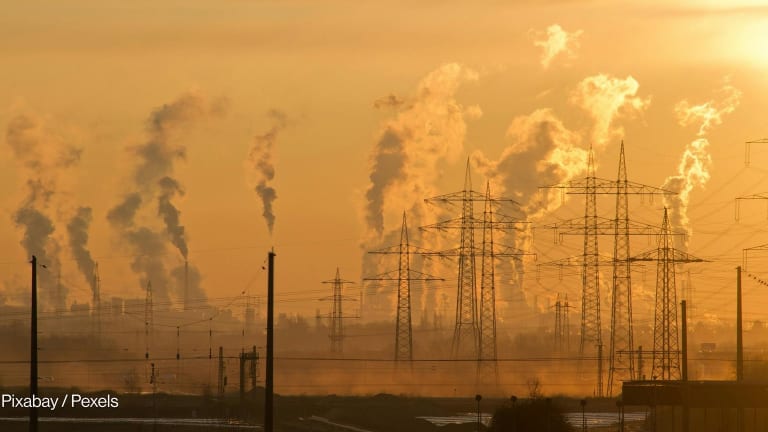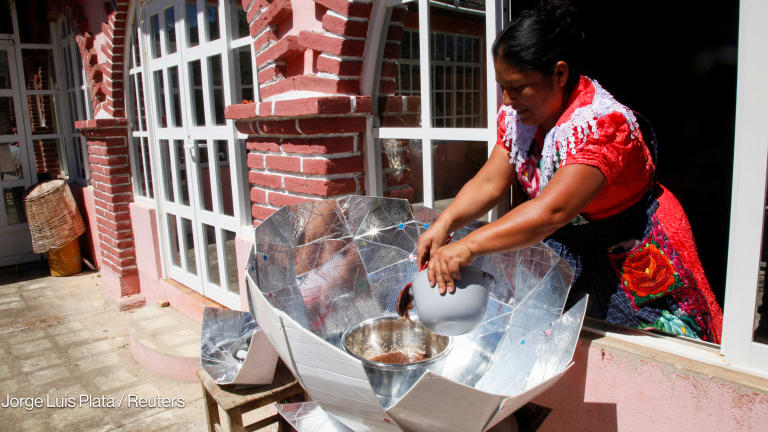
A cloud of dust and smoke hovers over Kampala’s bustling streets during rush hour: decades-old trucks transporting goods, taxi drivers idling in old cars with fussy engines, makeshift garages set up next to schools with untrained mechanics tinkering on imported used cars.
Part of our Focus on: People and the Planet
This series explores how climate change and other planetary imbalances impact the rising trend of human inequality. Explore the potential solutions to eliminate inequality and support a healthy planet.
“The air pollution situation is quite bad, but the problem is we don’t have much data to quantify this,” said Michael Wanyama, a mechanic who founded the Wanyama Autosafety Initiative last year, an NGO aiming to tackle air pollution in the city and push officials to act. “There’s little being done to deal with this.”
The situation in Uganda’s capital mirrors that of other sprawling African cities: A lack of air pollution monitoring paired with increased imports of high-emission cars has created a deadly situation. A 2019 UNICEF report found that deaths in Africa from outdoor air pollution increased by almost 60% between 1990 and 2017. But Wanyama and others in the sector are mounting a still-small resistance to the issue that they hope will reverse this trend.
Africa imported the world’s highest share of used light-duty vehicles globally between 2015 and 2018, according to an October 2020 report from the UN Environment Programme.
Uganda imports about 70,000 vehicles and 100,000 motorcycles per year, with over 40% of them being over eight years old, according to a presentation by the Ugandan transport ministry. According to a 2018 ministry survey, the average car in Uganda was 15 years old, and most were brought in from Japan, Singapore, South Africa, and the United Kingdom.
When the cars reach Uganda, more problems emerge. Many need regular repairs, and there’s little oversight on the operation of garages — so mechanics without proper training can sometimes leave a car spewing even more emissions, Wanyama said. He is also working to provide training to mechanics but says he lacks financing to scale the program.
Africa’s middle class is expanding rapidly, and they’re buying more and more used cars. That means more vehicles on roads, congestion, and longer commutes, said Raphael Arku, a Ghanian-born professor of environmental health sciences at the University of Massachusetts Amherst.
“There isn’t a reliable public transport network so everyone wants to buy their own car if [they] can afford it,” he said, “or they rely on mini buses, which are in the hands of the private sector and have no emission regulations.”
“You need data to reduce emissions and know what to tackle first. This is missing due to a lack of funding, lack of expertise, and lack of political commitment.”
— Raphael Arku, professor of environmental health sciences, University of Massachusetts AmherstNo measuring and monitoring of air quality
Over the last decade, Arku has noticed changes in Accra’s air quality: Particulate matter levels, stemming mostly from wood burning for household use, were dropping, while nitrogen oxide levels, an indicator of transport pollution, were increasing.
“Traffic is becoming the dominant source of air pollution in Accra which makes me suspect the same is the case in Lagos, Kampala, Dar es Salaam, Nairobi,” he said. “In all the big cities, it’s the same story: traffic is slowly becoming the predominant air pollution factor.”
While vehicle imports are tracked, their effect on air quality is still barely measured and monitored, resulting in lack of action. Nine of the 13 most populous countries where governments don’t have a long-term outdoor air quality monitoring program are in Africa, according to a July 2020 assessment from the OpenAQ team, an international air quality data platform.
“You need data to reduce emissions and know what to tackle first,” said Arku. “This is missing due to a lack of funding, lack of expertise, and lack of political commitment.”
Ghana, which is internationally considered one of the most progressive countries in the region when it comes to tackling air pollution, still doesn’t have enough capacity to properly monitor air quality, he added.
Arku is currently running a large research project in the Accra region, measuring particulate matter, Nitrogen oxide, and noise levels, with the goal of developing a model to predict air pollution exposure and effects on health.
He hopes his work will provide authorities with additional data to be able to step up measures. As of 2019, only about 6% of African children lived near an air quality monitor, compared to 72% in Europe and North America.
“Civic education is key,” Arku said. “If the general population understands the health impacts air pollution has on children and respiratory illnesses, there will be a growing appetite from the public to see change.”
Change in the air
Tackling air pollution needs to be a multi-sector approach, experts say, which includes both boosting air quality measurements and better regulating the emissions of incoming cars.
Uganda banned the import of cars that are older than 15 years in 2018, while Kenya has banned cars more than 8 years old. As of this year, cars 10 years or older are banned from Ghana, a move also meant to attract manufacturers to set up shop in the country.
“Even if governments in Africa say we are banning every used vehicle coming, the question is do people make enough money to afford a brand new car,” Arku said. “It’s a very difficult situation for governments to handle.”
The UNEP report recommended setting up harmonized rules at the regional level to regulate the trade of used vehicles, better promoting used low-emissions cars as alternatives, and boosting enforcement of the regulations.
Meanwhile, U.S. embassies across Africa have set up their own air monitoring stations, which can provide additional data. There’s also a growing focus on low-emission rapid transit, said Helen Ho, a program manager focusing on air quality at C40, a network of nearly 100 mayors collaborating to fight climate change.
In January, Nairobi announced the five-city routes schedule for its new rapid bus system. Senegal is also working on the Dakar Bus Rapid Transit project, with financial help from the World Bank, set to be completed in 2023.
Ho’s team supports cities to build their air quality management capacity, monitoring, data analysis, and health impact assessments. They recently helped Addis Ababa develop an air quality management plan, and are working with authorities in Dar es Salaam to deploy monitors for a study.
As for Wanyama, he is also working on a research paper looking at mechanics’ challenges in informal and makeshift garages. He plans to release it this summer to shed light on a currently data-less topic.
Wanyama said the motivation was his first-born child, who suffered from respiratory illnesses as a toddler.
“This pushed me so much in trying to improve things for society,” he said. “Personally, I may have an idea of how to keep my children away from pollution but there are millions of parents that have no idea.”
This focus area, supported by the U.N. Development Programme, explores how climate change and other planetary imbalances impact the rising trend of human inequality and vice versa. Visit the Focus on: People and the Planet page for more.









